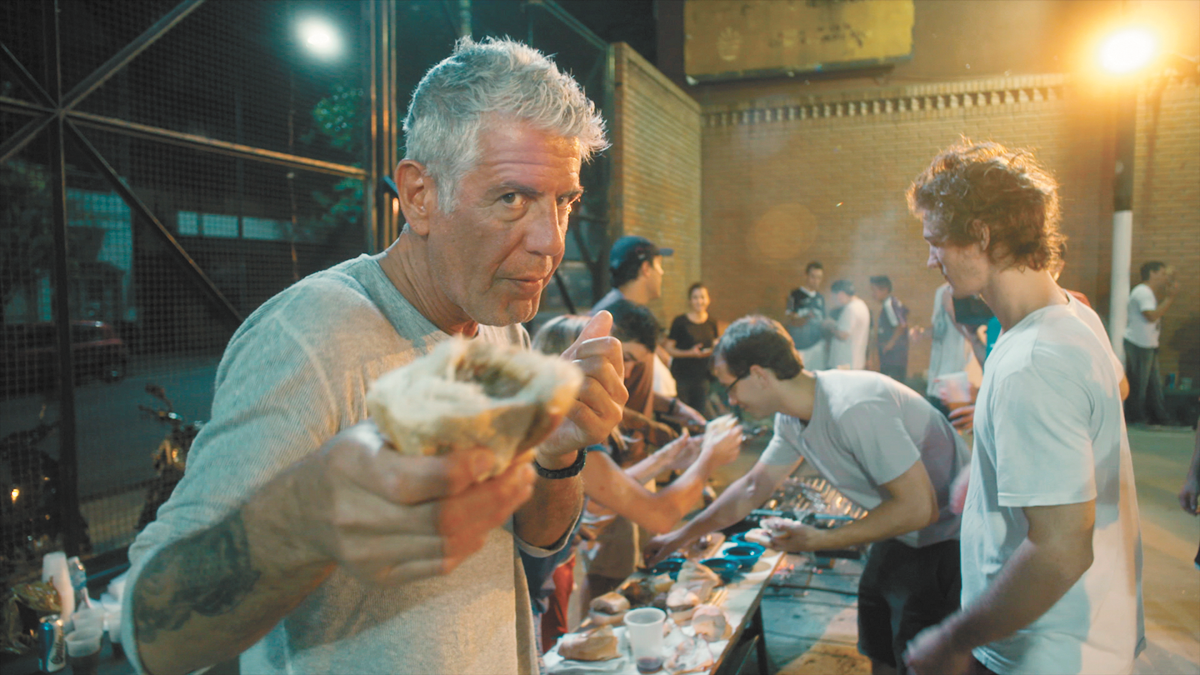Anthony Bourdain was a man always chasing that next hit of dopamine. That next fix. When he was young, it came in a literal sense — heroin. But then he quit that cold turkey — a nearly unparalleled feat that shocked his friend, artist David Choe. In the most revelatory moment in the new documentary Roadrunner: A Film About Anthony Bourdain, Choe says that what he realized through observation was that Bourdain's addiction never went away, it just jumped from new interest to new interest until he committed suicide at age 61 in 2018.
What made Bourdain a star on his various culinary travel shows (A Cook's Tour, No Reservations, Parts Unknown) was twofold. First, he had an amazing appetite for new experiences and a true empathetic curiosity. But second, and perhaps even more importantly, he always felt like the coolest guy you could possibly hang out with while globetrotting.
At its core, Roadrunner mainly feels like it's one last hang with Tony for fans and the people who loved him.
Under the watch of director Morgan Neville — Oscar winner for 20 Feet From Stardom (a profile of background singers) and an absurd Oscar snub for the even better Mister Rogers doc Won't You Be My Neighbor? — the film seems designed for those who already love Bourdain. It doesn't go deep contextualizing his rise to fame, more taking it as a given, and also doesn't offer many unexpected revelations into his person. In some ways, it has a very TV documentary feel (it is a product of CNN Films), letting the immense trove of existing footage do the work with assistance from interviews with his friends (fellow chefs, his TV directors, producers, camerapeople, ex-wives, and artists like Choe and Queens of the Stone Age's Josh Homme).
Bourdain was a chef who was known for his zeal for life far more than for what he made in the kitchen, gaining fame initially via his bestselling book Kitchen Confidential. When his following book, A Cook's Tour, blossomed into a television show, Bourdain found the calling for the rest of his days. He was the swashbuckling rebel pirate of the food world, as he put it, "the antidote to the chummy and adorable TV chefs" like Emeril Lagasse. Perhaps his aura can best be distilled by a shot in the film where an exhausted Bourdain is slumped on the floor of an airport, puffing a cigarette under a sign that reads "Be a Traveler, Not A Tourist."
Being someone who spent 250 days a year traveling means Roadrunner can basically track his entire life in the spotlight. (There are also plenty of vertical cropped videos from his Instagram posts, which — I realized while watching this film — will become ever more present in future documentaries.) Strangely, despite the massive video archive, the movie seems to build its framework around who they were able to get to sit down for an interview more than anything else, at times seeming to slow down for individual vignettes.
But even while he was becoming a beloved figure, the love around him didn't seem to penetrate his soul. Darkness loomed around every corner, even if his outward appearance stayed gregarious. The film documents his addictions jumping from cooking to writing to TV to family to taekwondo to lovers. It paints a picture of a bipolar man haunted by romantic ideals of life he can never seem to attain (though actually the fact that he was bipolar and clearly so is shockingly never mentioned considering how much it explains). In the end, the darkness won.
That also sets up the most uncomfortable part of the Roadrunner — its portrayal of Bourdain's last girlfriend, actress Asia Argento (who is not interviewed). Neville paints her in an unflattering light that feels really unseemly, coming up just short of blaming her for pushing Bourdain to the point of suicide by being a chaotic sort of passionate lover and then eventually canoodling with others. By the time Neville allows one of the talking heads to step in and say it's all Anthony's fault, not Asia's, the damage has mostly been done.
Roadrunner will largely satisfy the appetites of those who want a final taste of Anthony Bourdain, but it's not a rich multicourse offering, and its relatively straight-forward plating won't be earning any Michelin stars. That said, the literal final action of the movie — which involves Choe — is one of the most tremendously fitting ways to cap a documentary you'll ever see. So maybe at least stick around for that dessert. ♦

